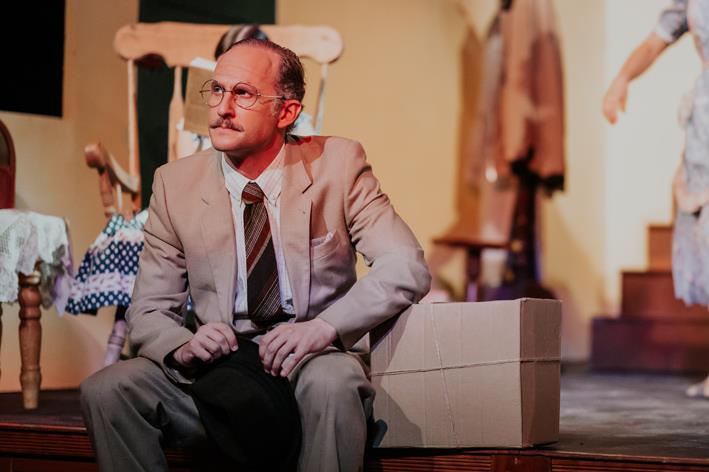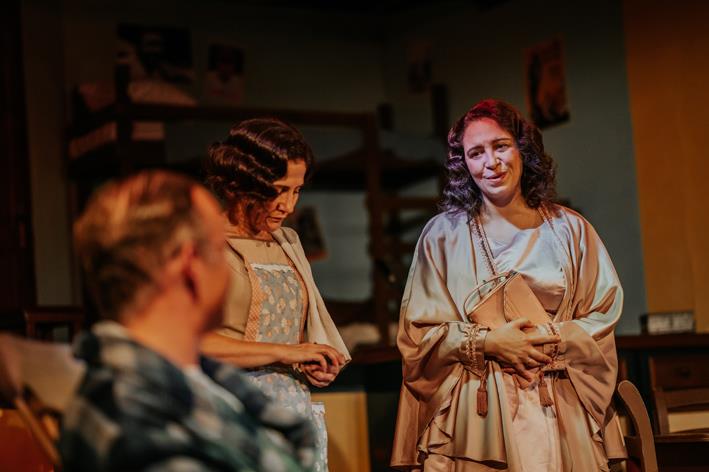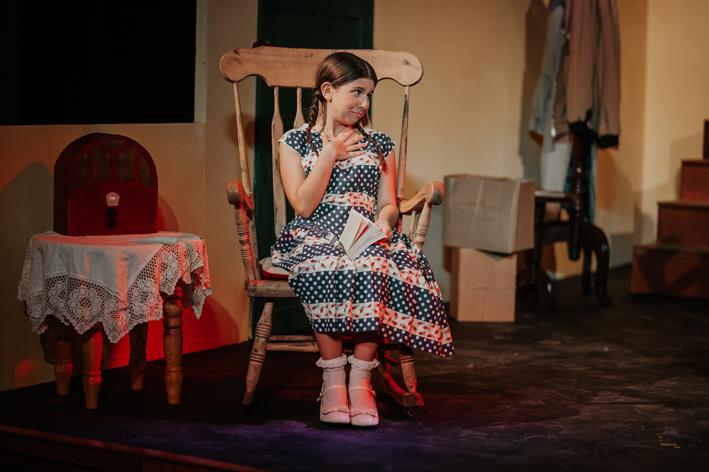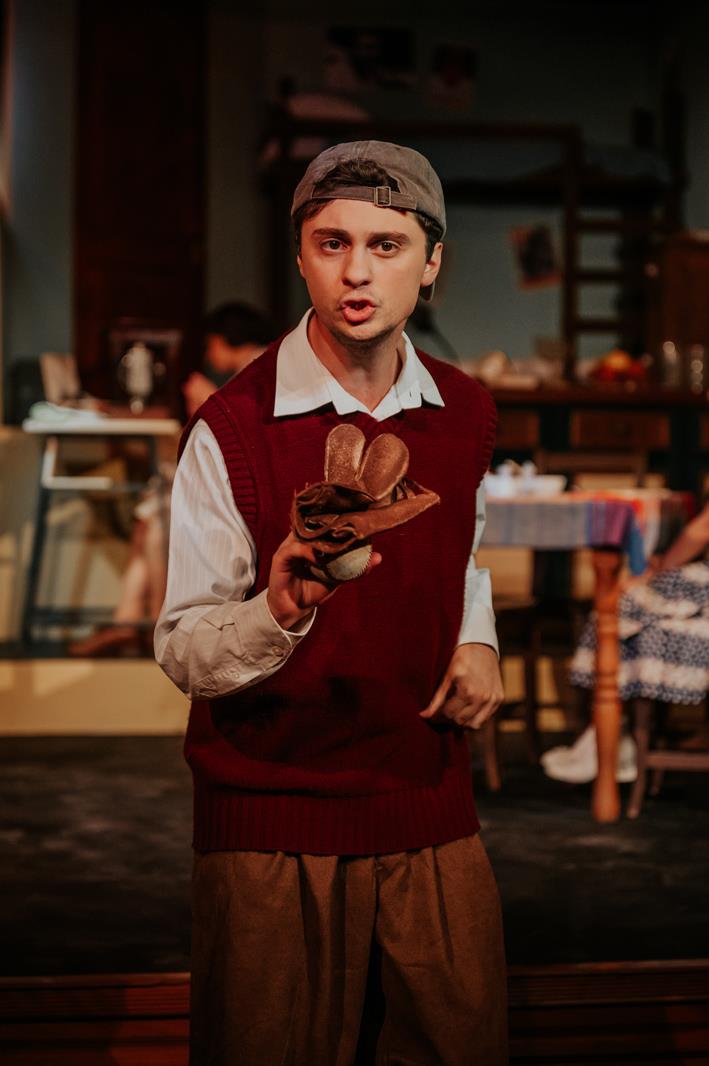The pre-initiation of the drama, with the Jerome family life already ongoing and characters running their daily business, as the audience found their seats, was immediate, strong character exposition from a directorial viewpoint.
A studious Laurie (Leah Grech) was absorbed in her book as her mother, Blanche (Erica Muscat), worked hunched over a sewing machine. Meanwhile, Blanche's sister Kate (Antonella Axisa) fussed around the house with her younger son, Eugene (Luke Chappell), idling away, thoroughly bored. The product was frustrated movement contrasting with focused stillness, reflecting very different personalities.

Furthermore, exposition of the time period was quickly established through Vera Lynn-style music in the background and the costume of their daily life; dresses aside, Laurie had polished Mary-Jane shoes while Blanche wore a Pinafore apron. One must applaud the actresses for the brushed curls, in vogue at the time, which must have been a pain to style and a strain on their hair, but gave a clear testimony of their dedication to the art.

In light of this, and subjectively speaking, one may argue that Brighton Beach Memoirs never had a curtain time. It certainly didn't start with the audience seated. Those who stepped into the theatre raised their own curtain to a parallel timeline. The start of the audience's own run-time was only made aware to the characters by the illuminating of the stage from its dim sepia. This subtle, active yet voyeuristic style was further emphasised by Eugene consistently breaking the fourth wall. In conclusion, the outcome justified director Tyrone Grima concluding the production with an audience address, similar to Wilde's, "I congratulate you on the great success of your performance."

Brighton Beach Memoirs was a masterclass in drama by the rightly lauded Neil Simon. Multiple conflicts sprouted in minutes, yet never satisfied the audience with swift resolution. As one conflict was put on hold, with one character concluding a scene, another stepped in dragging a new conflict behind them. Additionally, as each character developed their own conflict, the growing tangle of opposing wants grew more complex through growing interconnections. The audience's relief of tension was promised at the same time as the characters: dinner time; with mutual anticipation arising between the audience and characters.

As Act 1 came to a close, Act 2 swept in, three days after Act 1's short-lived peace of mind, to quickly present a fresh skein of conflicts without the hope of a promised time of resolution, that is, dinner time as in Act 1. Furthermore, Act 2 raised the stakes even higher following the father, Jack (Jacob)'s heart attack and consequent fragile health condition. Through this development, suspense wasn't focused onto a single point anymore, but pervaded every moment of character tensions in Act 2 with a fear of being Jack's physical last straw.

Meanwhile, the set could be compared to an open, old-fashioned doll's house which was conducive to the numerous conflicts since it allowed the events of the narrative to carry on, while other characters stewed in their respective dilemmas, fully visible to the audience. This not only emphasised the inter-linking of the conflicts but constantly reminded the audience of problems yet to be solved, as more mounted. Despite being a highly-detailed, multi-level and fully-furnished representation of a 1938 household, the actors transitioned between rooms very smoothly and navigated the set without any awkwardness, as though it really was their home.
Praise must be given for the actors' successful use of a Jewish-style Brooklyn accent which was clear and certainly no mean feat. The duelling typewriters' rhythm of the drama, provided by the speech, was not only adherent to its location but prevented the audience from brooding on heavy themes and quickly drove the narrative forward like the local Q train. Additionally, Eugene, apart from being the audience's Virgil-like guide through his complex family dynamics, had an innocence, though rapidly fading (not in front of his mother, however), imagination and lightning-fast quips that made the performance, as a whole, light-hearted.
That said, Simon didn't allow Eugene to strictly be the audience's safety net and developed the young narrator as a character in his own right. Chappell's interpretation built Eugene to the peak of cheek and wit, with an apparently undefeatable personality, before letting it all suddenly crumble following a fight with his idolized older brother, Stan (Bernard Zammit). The huddled, child-like Eugene crying in bed, was a carefully, almost cruelly, planned and executed tug at the heartstrings.
An uncanny likeness between the Russo-Jewish and Maltese culture was drawn in the play from trivial things; the mother telling her child not to shout because a cake is in the oven, the neighbourly tradition of treating suffering as a competition, and the sense of duty towards family, to the strong mentality of pater familias.
The idea of pater familias is subject to a close study in the play; while the father is patriarch with the privilege of reading the newspaper first and being the decision-maker for the whole family, including a widowed sister-in-law, Jack (Edward Caruana Galizia) provides a case study that challenges the domineering perception. Before making his entrance on stage, Jack is expected to be a culturally-enabled iron-fisted head of the Jerome family. But when Caruana Galizia makes his anticipated entrance as the denoted provider of solutions to the family's issues, the audience realizes that heavy lies the crown. Indeed, one wonders if the role is even desired by Jack, interpreted by Caruana Galizia as a kind and caring man that defies the patriarchal stereotype. With Jack working himself to near-death, a sense of tiredness is given-off by Caruana Galizia and, following Jack's heart attack, the audience's sympathy is his. Jack's style of pater familias is reminiscent of King Solomon in his sense of justice and compromise. Furthermore, despite the tradition-bestowed power over his niece, he respects the sacred ground of his late brother-in-law.
Ultimately, however, it is revealed that the pater familias idea doesn't really exist and is broken down further by crippling poverty. While the father has his respected role, it is actually the unsung mother who keeps the family; the machine behind the breadwinners, afloat. Kate, portrayed steely by Axisa, housekeeps and navigates the daily family troubles but also goes on to break her sister, Blanche, free of her grief and inferiority complex. In fact, Blanche goes on to live a life free of insecurities, without a male figure to make the big decisions for her, as symbolised by the removal of her glasses by the end of the play.
It is a great shame that this play, the first in Simon's Eugene Trilogy, is apparently so unknown to the local general public. That said, one hopes that such an intricate and technical production will make everyone, not just the theatre geeks, aware of Neil Simon and bring the unique Eugene back to the stage in the second instalment of the trilogy.
